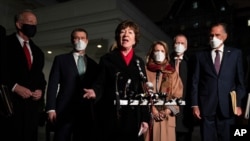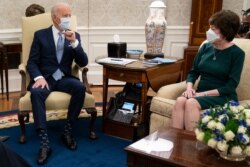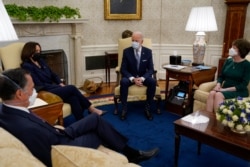The White House and a group of U.S. Senate Republicans held what the two sides respectively called “substantive and productive” and “frank and very useful” talks Monday about a new round of coronavirus economic relief.
Senator Susan Collins, a Republican from Maine, told reporters following the two-hour meeting with President Joe Biden and Vice President Kamala Harris, “was a very good exchange of views.” She said the two sides did not reach an agreement on a bipartisan package, but that discussions would continue.
“All of us are concerned about struggling families, teetering small businesses and overwhelmed health care system, getting vaccines out and into people’s arms and strengthening our economy and addressing the public health crisis that we face,” Collins said.
Biden has proposed a $1.9 trillion plan, while the Republicans argue the relief should be more targeted with a price tag closer to $600 billion.
A White House statement late Monday said those involved in the negotiations “shared a desire to get help to the American people.” But it said Biden “will not settle for a package that fails to meet the moment.”
Biden has expressed a preference for getting bipartisan support for coronavirus aid, but reiterated Monday that pursuing a path with only the supports of the majority Democrats in Congress is an option.
House and Senate leaders said Monday they would move ahead to approve Biden's package with a process that does not depend on Republican support for passage.
“The cost of inaction is high and growing, and the time for decisive action is now," said Senate Majority Leader Chuck Schumer and House Speaker Nancy Pelosi in a statement.
Schumer told lawmakers on the Senate floor Monday, “The risk of doing too little is far greater than the risk of doing too much.”
On Sunday, Schumer complained that the Republicans are not starting near Biden’s spending proposal.
"We cannot do the mistake of 2009 (during the Great Recession) where they whittled down the program so that the amount of relief was so small that the recession lasted four or five years," Schumer told the New York Daily News.
Both Biden and the Republicans are calling for $160 billion for testing, vaccines and personal protective equipment on top of hundreds of billions that were approved last year as the virus swept into the United States.
But the president and the lawmakers diverge on other aid proposals. Biden wants to increase $300 weekly unemployment insurance payments from the federal government to $400 and extend them through September, while the Republicans want to keep the payments at the current $300 and only through July.
Biden has proposed sending most Americans, all but the biggest wage earners, $1,400 checks on top of the $600 checks that were approved by former President Donald Trump in late December. The Republicans are supporting $1,000 checks for lower-income Americans.







